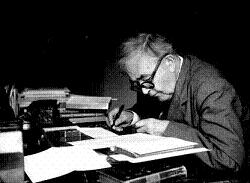Saturday, 16 June 2007
Following my previous post, Andy Goodliff asks: if you had to choose one book for each major doctrine, what would you choose? And so he posts a list of one book for every doctrine.
I thought I'd attempt a similar list – but I found it impossible to choose just one, so I've expanded it to two books for each doctrine. Here are my suggestions (with no more than two books from a single author – otherwise, the whole list might be overrun by Barth and Pannenberg). Which books would you choose?
Theological method:
Eberhard Jüngel, God as the Mystery of the World (1983)
John Webster, Confessing God (2005)
Doctrine of God:
Karl Barth, Church Dogmatics II/2 (1942)
Robert Jenson, The Triune Identity (1982)
Creation:
David Bentley Hart, The Beauty of the Infinite (2003)
Joseph Ratzinger, In the Beginning (1995)
Christology:
Wolfhart Pannenberg, Jesus – God and Man (1964)
Kathryn Tanner, Jesus, Humanity and the Trinity (2001)
Anthropology:
Wolfhart Pannenberg, Anthropology in Theological Perspective (1985)
Stanley Grenz, The Social God and the Relational Self (2001)
Salvation:
Karl Barth, Church Dogmatics IV/1 (1953)
Edward Schillebeeckx, Christ: The Experience of Jesus as Lord (1980)
Pneumatology:
Yves Congar, I Believe in the Holy Spirit, Vol. 1 (1983)
John Taylor, The Go-Between God (1972)
Ecclesiology:
John Zizioulas, Being as Communion (1985)
Hans Küng, The Church (1967)
Eschatology:
Jürgen Moltmann, Theology of Hope (1964)
Hans Urs von Balthasar, Theo-Drama, Vol. 5 (1998)
 Karl Barth's
Karl Barth's